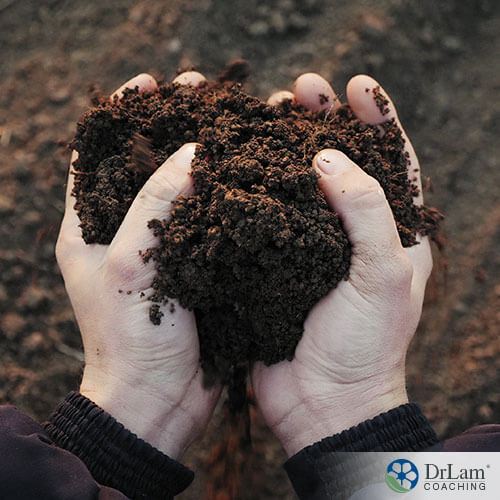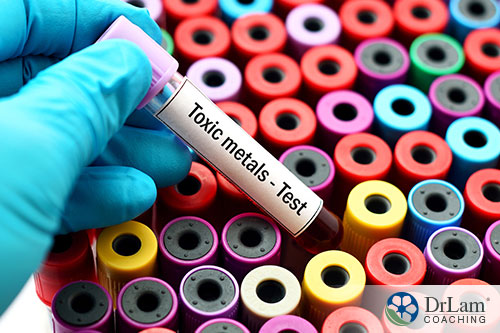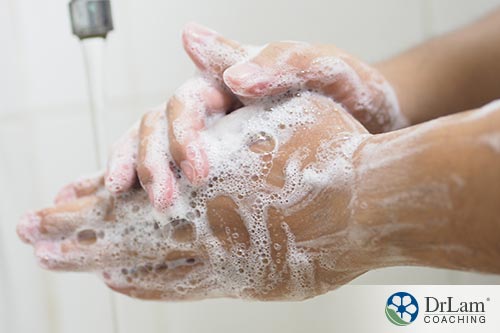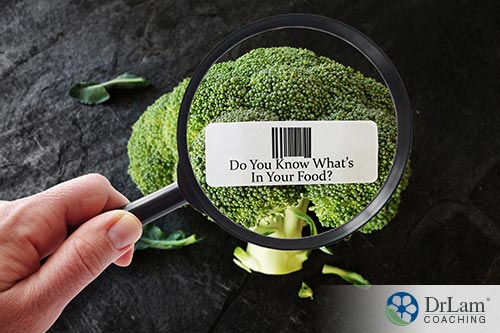 Growing your fruits and vegetables can be a pleasure beyond description. Getting your hands into the soil, enjoying the sunshine, and getting some exercise will benefit your health in countless ways. But, when you eat the fruits of your labor, you may suffer some unpleasant consequences. Unfortunately, there may be heavy metals in garden soil that can get into your fruits and vegetables. Therefore, ingesting these contaminants can be bad for your health, particularly if you have Adrenal Fatigue Syndrome (AFS). Let's keep reading to discover more details.
Growing your fruits and vegetables can be a pleasure beyond description. Getting your hands into the soil, enjoying the sunshine, and getting some exercise will benefit your health in countless ways. But, when you eat the fruits of your labor, you may suffer some unpleasant consequences. Unfortunately, there may be heavy metals in garden soil that can get into your fruits and vegetables. Therefore, ingesting these contaminants can be bad for your health, particularly if you have Adrenal Fatigue Syndrome (AFS). Let's keep reading to discover more details.
The heavy metals in garden soil can come from a variety of sources. Some of them are from human activity and others are there naturally. Most of the time, these contaminants build up slowly and over a prolonged period. Some of the most common sources of heavy metals in garden soil are:
All of these sources can deposit heavy metals in garden soil. Over time, these contaminants can accumulate and cause a serious health risk.
There are certain heavy metals in garden soil that are more dangerous than others. Some of the most problematic ones include:
You’ve probably never considered the idea that there may be arsenic building up in your garden beds. Arsenic may be found in well water, so it can get into your garden through irrigation systems. The history of your land is also important. If your land was ever used as an apple orchard, then you may be at risk. Many old orchards once used lead arsenate as a pesticide.
 Lead used to be in almost everything including gasoline, paint, and plumbing pipes. That’s why gardens near heavy traffic areas can contain lead. If you have an old house, then chances are that it was once covered in lead paint, which may have flaked off and landed in your garden. Another source of lead is the leaded pipes and fittings that were sometimes put into old houses.
Lead used to be in almost everything including gasoline, paint, and plumbing pipes. That’s why gardens near heavy traffic areas can contain lead. If you have an old house, then chances are that it was once covered in lead paint, which may have flaked off and landed in your garden. Another source of lead is the leaded pipes and fittings that were sometimes put into old houses.
These elements can all be toxic at high levels of concentration. Unfortunately, they can be found in high levels in fertilizers and mine waste. They can also come from natural sources, so it’s always a good idea to test for these contaminants.
Some heavy metals in garden soil are unexpected. Thallium and mercury are released by coal-fired power plants. So, if you live near one of these structures, you will need to get your garden tested immediately.
Smokers are most at risk from cadmium because tobacco tends to accumulate it. But it can also accumulate in green vegetables and grains. Cadmium in the soil usually comes from fertilizers or pesticides. But it can also be found in wastewater and industrial emissions.
If you’re concerned about heavy metals in garden soil, there are steps you can take to ensure that any food you produce will be safe for consumption. Here’s how you can protect yourself and your loved ones:
The first step is to get your soil tested to determine if it has any contaminants. You should also test your water for the presence of arsenic or other toxins. If the tests show heavy metals in garden soil, you’ll need to get the advice of experts to determine if you can remove them and how you would do so.
You should always wash your hands after working in the garden and before handling produce. This will prevent the spread of any contaminants. You should also wash vegetables with cold running water or soak them in vinegar and water to remove any lead (which can accumulate on the skin of root vegetables).
 Heavy metals in garden soil can be very hard to remove. So, if you’ve determined that your soil does contain contaminants, here are some strategies for reducing the amount that gets into your fruit and vegetables:
Heavy metals in garden soil can be very hard to remove. So, if you’ve determined that your soil does contain contaminants, here are some strategies for reducing the amount that gets into your fruit and vegetables:
By taking these steps, you will improve the quality of your crops. This will also help lower the toxic accumulation in your body and improve your adrenal fatigue symptoms and problems.
When you have AFS, everything you eat and do can have a positive or a negative impact on your body. This is particularly true when it comes to the food you eat. A poor diet (like one that’s filled with toxins or contaminants and lacking in nutrition) is a common cause of the stress that leads to AFS. Many people have poor diets and this puts your NeuroEndoMetabolic (NEM) stress response on alert. The NEM system in your body reacts to stress by causing changes that protect against that stress and prepare you to respond appropriately.
The adrenals are a vital part of this system because they release cortisol, which known as the stress hormone. However, the NEM stress response is designed to be active for short periods. If you’re stressed over a long time, then it may cause this natural regulatory system to become imbalanced and begin to malfunction. The adrenal glands are often the first organs to show this dysregulation. They can start to struggle to produce the cortisol that the body is demanding and even start to degrade. If the problem isn’t alleviated, it can result in some serious issues associated with AFS.
The system in your body that’s responsible for removing heavy metals and other contaminants is the Detoxification Circuit. This consists of the immune system, the liver, and the extracellular matrix (ECM). Typically, these three systems work in the background to detoxify your body and remove causes of stress. This circuit breaks down toxins and metabolites so they can be passed harmlessly out of your body. But when the Detoxification Circuit becomes dysregulated because of AFS, these processes start to malfunction. As a result, when you have AFS, the heavy metals in garden soil may do more damage to your body than usual.
There are also certain heavy metals that this circuit struggles to cope with even when it’s healthy. Mercury is an example of such heavy metals. The human body can’t deactivate or excrete mercury on its own. So, the accumulation of this heavy metal in your body is dangerous at the best of times. But when your Detoxification Circuit is malfunctioning, it’s even more damaging to your health.
 The liver is the organ that’s primarily responsible for deactivating metabolites and harmful substances so they can be passed out of your body. But when the Detoxification Circuit is weakened because of AFS, these metabolites aren’t removed properly or quickly enough. Sometimes, the liver even fails to deactivate them, which means they will damage any organ they encounter. As a result, people with AFS often experience an accumulation of toxic substances and metabolites in the ECM, which is the fluid-filled spaces between cells. This is where chemical messages travel throughout the body, and the accumulation of toxins can hinder or even block these messages.
The liver is the organ that’s primarily responsible for deactivating metabolites and harmful substances so they can be passed out of your body. But when the Detoxification Circuit is weakened because of AFS, these metabolites aren’t removed properly or quickly enough. Sometimes, the liver even fails to deactivate them, which means they will damage any organ they encounter. As a result, people with AFS often experience an accumulation of toxic substances and metabolites in the ECM, which is the fluid-filled spaces between cells. This is where chemical messages travel throughout the body, and the accumulation of toxins can hinder or even block these messages.
The next part of the Detoxification Circuit that usually reacts to the emergency is the immune system. It will perceive the toxic stew in the ECM as a threat, and cause inflammation to combat it. The inflammation may be aimed at removing the threat, but when the system is unbalanced, it will only cause more damage and stress. This creates dangerous ECM pollution, immune system hyperactivity, and liver congestion. Each system and organ involved will decline, progressively worsening the health and functioning of the others because of their interconnectedness. This will lead to painful symptoms and a worsening of your overall condition. That’s why, if you have AFS and like to grow your fresh produce, then you need to be concerned about heavy metals in garden soil and take steps to alleviate such problems.
Don’t let the heavy metals in garden soil stop you from growing your fruits and vegetables. Growing and eating fresh produce can give you numerous health benefits. You just need to take a few precautions to ensure that your garden's soil and your body both remain healthy. This will also decrease the toxic load that your Detoxification Circuit has to deal with and improve your AFS too. So, keep gardening; just exercise care!
© Copyright 2021 Michael Lam, M.D. All Rights Reserved.
Unfortunately, there are often heavy metals in garden soil. These contaminants can come from air pollution, from the water, or from the ground itself. And if you grow your vegetables or fruit in that soil, that means that you’re likely eating the toxins as well.
